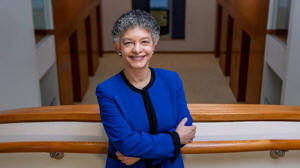|
Collins will start her job on July 1, the Boston Fed said in a
statement. By then, the Fed is likely to have already begun to
tighten monetary policy to fight inflation, raising interest
rates and perhaps shrinking its balance sheet.
Collins will be in place to weigh in on Fed policy within weeks
of starting, at its July 26-27 policy meeting. Following Fed
rules, Philadelphia Fed President Patrick Harker will continue
to vote for the Boston Fed until then.
She fills a vacancy left by longtime Boston Fed President Eric
Rosengren, who resigned last fall during an ethics probe into
personal trading by Fed officials during the pandemic.
Fed policymakers and outside observers say it is important for
Fed leadership to diversify to look more like America and citing
research that suggests a wider range of viewpoints improves
decisions.
Choosing Collins is a "historic step" for the Fed, says Benjamin
Dulchin, campaign director for policy advocacy group Fed Up.
"Working people want an economic recovery that includes everyone
this time, and Dr. Collins has the deep expertise that the Fed
will need."
The Boston Fed is one of 12 regional Fed banks whose presidents,
along with members of the Washington-based Fed Board, set U.S.
monetary policy. Three other Fed bank presidents are women, and
two are nonwhite men.
The Fed Board is all-white, though U.S. President Joe Biden this
year nominated three new Fed governors who would make the Fed's
top leadership the most diverse by race and gender in its
108-year history, if the U.S. Senate confirms them.
Two nominees, Davidson College's Philip Jefferson and Michigan
State's Lisa Cook, are Black. The addition of Biden's third
nominee, former Fed Governor Sarah Bloom Raskin, would give the
Fed Board four women governors for the first time.
The Senate Banking Committee is slated to vote on Biden's Fed
nominees next week. Regional Fed presidents, unlike nominees to
the Fed Board, do not need Senate confirmation.
A KNOWN FIGURE
Like Cook and Jefferson, Collins comes from academia, a
professor of public policy and economics with a PhD in
economics. She is well-known among monetary policymakers,
frequently moderating at the Kansas City Fed's annual Jackson
Hole symposium, global central banking's best-known conference,
among other work. She also served as a director at the Chicago
Fed for nine years.
Her academic research has focused on emerging markets, exchange
rates and trade. Other roles have included senior staff
economist for President George H.W. Bush's Council of Economic
Advisers, professor at Georgetown and Harvard Universities, and,
in 2001, visiting scholar at the International Monetary Fund.
Less well known is her stance on monetary policy. In 2019, she
suggested in an interview that the Fed would do well to consider
raising its 2% inflation target to allow the labor market more
room to heal. Her view on the current situation is unclear, with
a strong job market and inflation at 7%.
In addition to helping set monetary policy, Collins' job will
entail overseeing the Boston Fed's banking supervision,
community outreach, and its lead role at the central bank in
research on technology that could be used if the Fed adopts a
central bank digital currency.
The bank recently released the first phase of a multi-year
research project with the Massachusetts Institute of Technology
(MIT), Collins' alma mater, and will explore issues such as
security and programmability in later phases.
Former Boston Fed president Rosengren and Dallas Fed president
Robert Kaplan resigned last fall after disclosures they
conducted active trading - Rosengren in real estate securities
and Kaplan in stocks - as the Fed undertook an aggressive rescue
effort.
Fed Chair Jerome Powell has since overhauled ethics rules to bar
most active trading by senior Fed officials, and asked the
central bank's inspector general to launch an investigation into
the trading. That probe is ongoing.
(Reporting by Ann Saphir with reporting by Jonnelle Marte;
Editing by Andrea Ricci and David Gregorio)
[© 2022 Thomson Reuters. All rights
reserved.]
This material may not be published,
broadcast, rewritten or redistributed.
Thompson Reuters is solely responsible for this content.

|
|





